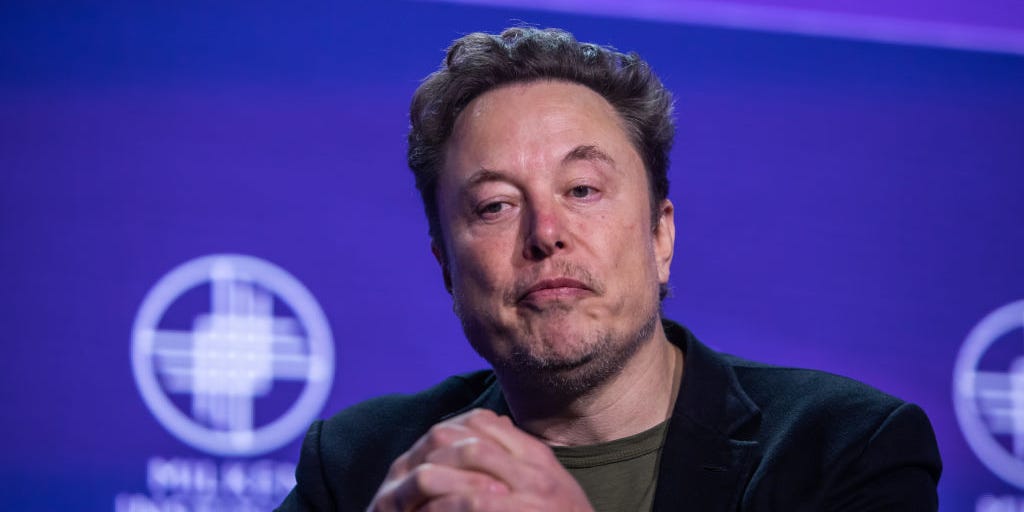- Tesla investors voted Thursday to approve Elon Musk's multibillion-dollar compensation package.
- But some institutional investors told BI that Musk's award was a mistake.
- Some investors questioned whether Musk was fit to continue leading Tesla.
Some institutional investors in Tesla told Business Insider that they made a mistake in approving Elon Musk's record-breaking compensation package and that they have lingering concerns about his ability to lead the company.
Investors who own about 72% of the company voted Thursday to approve Musk's $55 billion compensation package that had been rejected by a Delaware court in January. The vote doesn't immediately reinstate Musk's pay, but it does give Tesla's lawyers some ammunition as they refile their lawsuit in Delaware.
Reuters reported that Vanguard, Tesla's largest institutional investor, which owns 7% of the company's shares, voted to approve the compensation package.
But despite the overwhelming approval of Musk's compensation package, institutional investors who spoke to Business Insider are skeptical that the $55 billion in stock options is commensurate with his performance, and continue to have concerns about Musk and other company executives.
“Tesla is a great company, but it has become clear once again that its governance is not so good,” Anders Schelde, chief information officer at Akademiker Pension, a Danish pension fund that invests in Tesla, said in an email to BI. “We remain invested, but governance is a red flag. We are seriously wondering whether Tesla would be a better company with or without Musk, and I think many investors are asking the same question.”
AkademikerPension was one of eight Tesla institutional investors that co-signed a letter in May urging other investors to vote against both Musk's compensation package and the re-election of James Murdoch and Musk's brother, Kimbal Musk, to Tesla's board of directors. The investors voted to retain both men.
It is unclear how many Tesla shares AkademikerPension held as of June 14.
Shareholders want board oversight
At the shareholder meeting on Thursday, Musk disputed the concerns of institutional investors, without naming any specific investors.
“When I talk to a lot of big institutional investors… they're usually in New York and they don't drive,” Musk said at the conference. “So I say, 'Um, have you tried self-driving? Like version 12.3?' And they say, 'Um, no.' OK, well, you should try it. You should.”
New York City Comptroller Brad Lander, who signed the May letter, also said in an email to BI that approving the compensation package was a “mistake,” but that the company should develop a clear plan for steady growth and keep Musk focused on that goal.
“We expect true board oversight and a CEO who is deeply committed to growing Tesla, not other businesses,” Lander said in a statement. “The board should ensure that shareholder interests are aligned with the company's goals and that any attempt to leverage Tesla's resources for Musk's other businesses requires approval.”
Lander added that the board should set up a “compensation forum” to renegotiate an incentive plan for Musk that is less dilutive to shareholders, rather than defending the compensation package in court.
A spokesperson for Lander told BI that as of April 30, the New York City Retirement System held more than 3.4 million shares of Tesla stock.
The California Public Employees Retirement System (CalPERs), which holds about 9.2 million Tesla shares according to its pension fund, has been a vocal advocate of ending Musk's compensation package.
A CalPERS spokesman declined to comment but pointed to a statement released the day before Thursday's shareholder vote in which the company said Musk “is entitled to be adequately compensated for his work” but that his current compensation package is excessive and “highly dilutive to shareholders.”
“This exorbitant compensation package is inconsistent with CalPERS' long-held views on executive compensation,” CalPERS CEO Marcy Frost said in a statement. “It is excessive relative to executive pay at industry peers, significantly dilutes shareholders and is not linked to Tesla's long-term profitability.”
Musk and a Tesla spokesman did not immediately respond to requests for comment.

